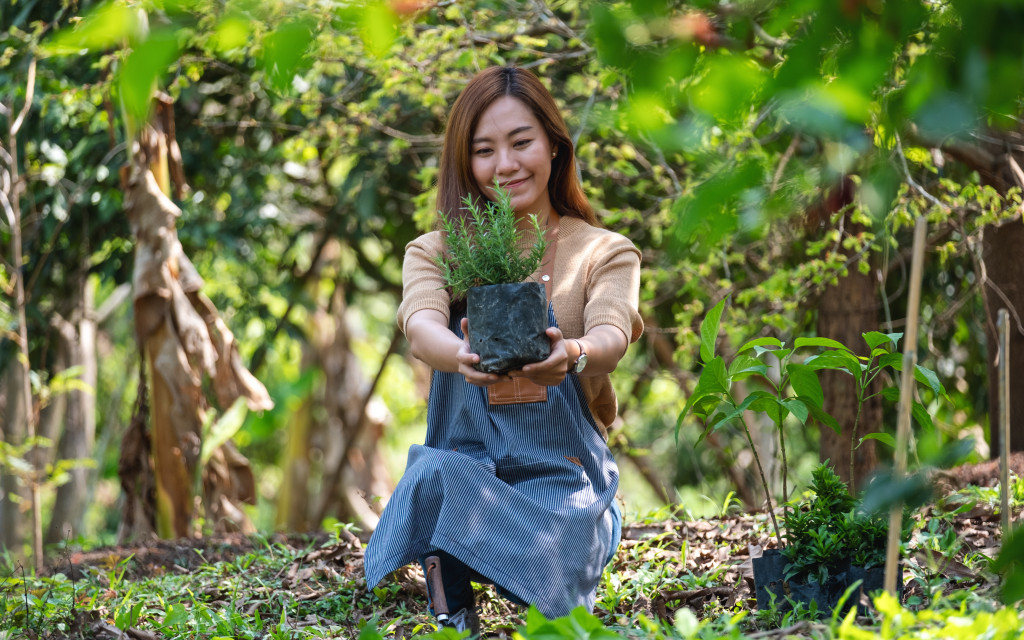Disclaimer: This website provides health information for educational purposes only and is not a substitute for professional medical advice, diagnosis, or treatment. Always seek the guidance of a qualified healthcare provider with any questions you may have.
- Growing your herbs includes improved culinary skills, natural remedies, and garden aesthetics.
- When selecting herbal plants, factor in needs and preferences and assess the environment.
- Plan for a water system, and choose the right location for your herbs based on their light and moisture needs.
- Regularly harvest your herbs for culinary, medicinal, or other purposes to enjoy the rewards of your hard work.
Are you looking to add a touch of natural goodness to your daily meals and support your overall well-being? Growing herbal plants in your garden have numerous benefits, from improving your culinary skills to providing natural remedies and enhancing your garden’s aesthetic.
This ultimate guide will explore creating a thriving, diverse herbal garden that will contribute to your health, happiness, and environment. So, let’s dive into the world of herbal plants and discover how to cultivate your very own green paradise.
Deciding on Your Herbal Plants
When enhancing your garden, selecting the right plants goes beyond mere aesthetics. Herbal plants, often referred to as “green gold,” provide many benefits, from culinary to medicinal to ecological purposes. Understanding which herbal plants are ideal for your garden, however, might seem like a daunting task, but it doesn’t have to be. Here are some tips:
Determining your needs and preferences
Before getting your hands dirty, you must analyze your needs and preferences regarding herbal plants. Are you interested in growing herbs primarily for culinary purposes, or are you more focused on their medicinal benefits?
Perhaps you’re intrigued by attracting pollinators, like bees and butterflies, to your garden with fragrant and visually appealing herbs. B
Considering your garden’s conditions
After deciding on your herbal plant goals, it’s essential to assess the overall conditions of your garden. Consider factors such as climate, soil type, sun exposure, and available space, all of which significantly determine which herbs will thrive in your environment.
For instance, herbs like rosemary, sage, and thyme generally prefer warmer climates and well-draining soil, while mint, chives, and parsley can tolerate more shade and moisture.
Water System

A healthy garden always starts with a proper water system. If you plan on using an irrigation system to ensure your plants receive the right amount of nutrients, consider installing a drip irrigation system, which is cost-friendly and easy to install. For container gardens, utilize self-watering pots to provide your herbs with enough moisture.
If possible, consider investing in an IBC tank. This is a great way to ensure your garden has a constant water supply, as IBC tank line strainers can filter out debris and contaminants. Also, check if your local water authority offers discounts or rebates for rain tanks and water-saving devices.
Choosing the Right Location
Herbal plants have different needs regarding light, water, and temperature, so finding the perfect location for your herbal garden is crucial. Most herbs require full sun, meaning a minimum of six hours of direct sunlight daily. However, some herbs like parsley, mint, and cilantro prefer partial shade.
Drainage is also crucial, as most herbs don’t like sitting in wet soil for extended periods. Plan your garden layout based on the unique requirements of each herb, and be sure to space them appropriately to allow for healthy growth.
Planting and Caring for Your Herbs
Once your soil is well-prepared, it’s time to plant your herbal plants in your garden. Most herbs can be grown from seeds or transplants. If starting from the seed, follow the instructions on the seed packet regarding depth and spacing. If using transplants, gently loosen the root ball and plant at the same depth it grew in its previous container. Here are some additional tips for proper plant care:
Fertilize
Most herbs prefer nutrient-rich soil, so adding fertilizer or compost is best to provide your plants with the necessary nutrients for healthy growth. Remember that some herbs, like rosemary and oregano, don’t need much fertilizer and can even become overfertilized if given too much.
Weed
Once your herbs have been planted and watered, keeping them free of weeds is important. If left untreated, weeds can rob your plants of essential nutrients and moisture. Hand-weeding is best; it removes the entire weed root and helps prevent future growth.
Harvesting and Utilizing Your Herbal Plants

The best part of growing your herbal plants is reaping the rewards of your hard work. Harvest your herbs regularly to encourage continued growth, but never remove more than one-third of the plant at a time. Use freshly picked herbs in your favorite recipes, make herbal teas, or experiment with homemade remedies.
The Bottom Line
Growing your herbal plants in your garden is an enjoyable and rewarding process that brings many benefits to your daily life. Take this guide as a starting point and experiment with different herbs to find what works best for your garden. With the proper knowledge and care, you can create a flourishing oasis of herbal goodness in no time.




